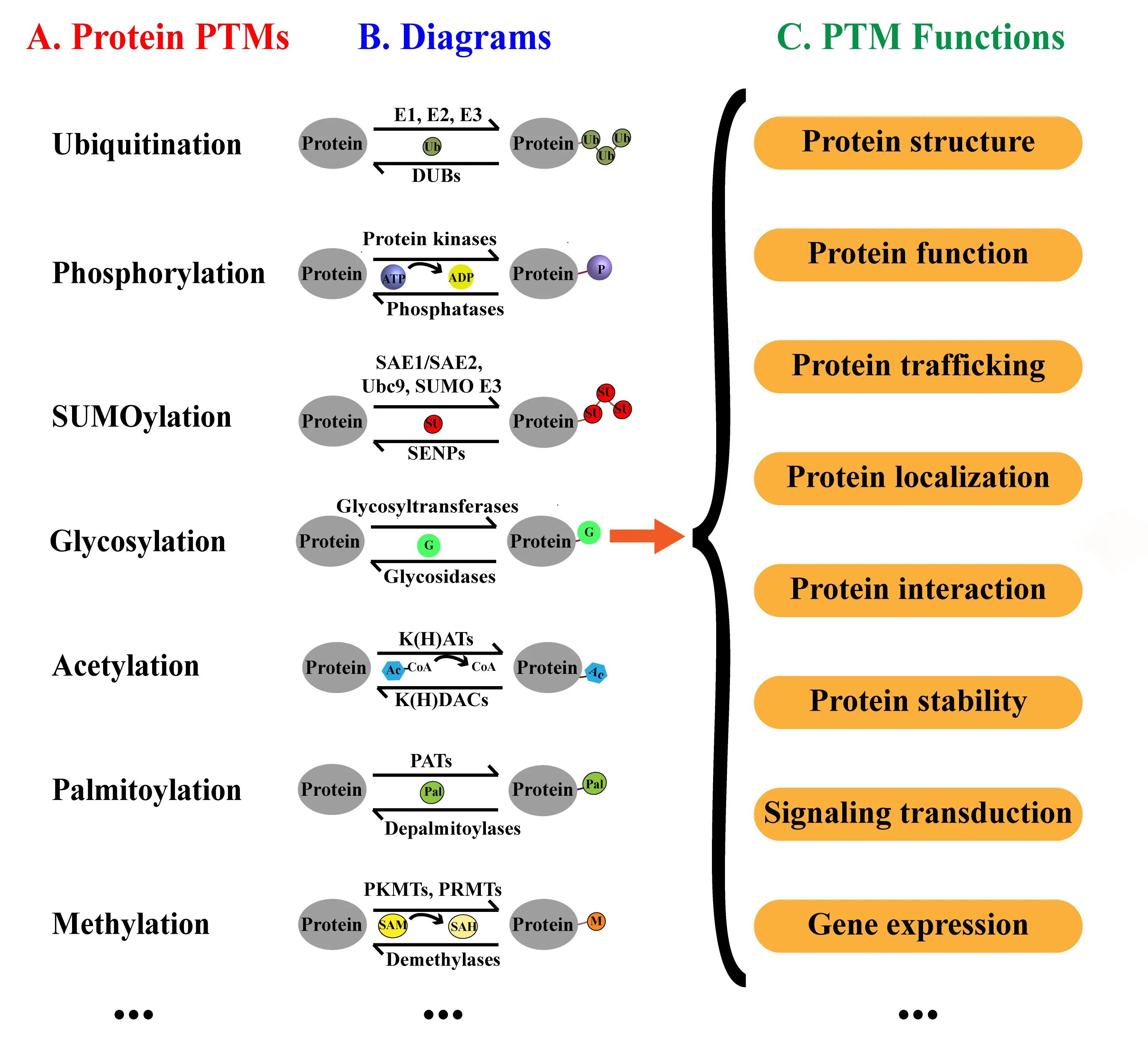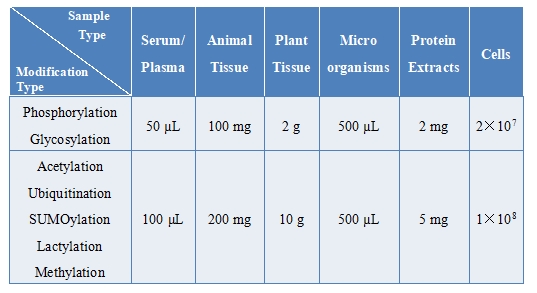Global PTMs Profiling Service
Global PTMs profiling is a systematic proteomics analysis technique based on high-resolution mass spectrometry, designed to comprehensively identify and quantify various types of post-translational modifications (PTMs) in biological samples, including phosphorylation, acetylation, ubiquitination, methylation, and glycosylation. By integrating enrichment strategies with LC-MS/MS detection, this service enables the unbiased capture of PTM diversity, revealing precise modification sites and regulatory patterns.
The global PTMs profiling service is widely applied in the study of signal transduction mechanisms, biomarker discovery, drug mechanism elucidation, and cellular function regulation. It serves as a key tool for deciphering protein functional states and their dynamic changes, especially in cutting-edge fields such as cancer biology, neuroscience, immunology, and metabolic research.

Zhu, Q G. et al. Frontiers in Oncology, 2024.
Figure 1. Protein PTMs and Biological Functions.
Services at MtoZ Biolabs
Leveraging a high-resolution mass spectrometry platform, MtoZ Biolabs has launched the global PTMs profiling service focusing on comprehensive detection and quantitative analysis of multiple types of protein post-translational modifications. This service integrates efficient modified peptide enrichment strategies with multi-stage tandem mass spectrometry, enabling simultaneous identification and quantification of various modifications such as phosphorylation, acetylation, ubiquitination, and methylation. The service output includes modified peptide sequences, site-specific modification information, abundance variations, and bioinformatics annotations, facilitating the study of protein functional states, signaling pathway regulation, and disease mechanisms—thereby providing robust data support for basic research and drug development.
Analysis Workflow
1. Protein Extraction and Digestion
Total proteins are extracted from cells, tissues, or biofluids, followed by enzymatic digestion to generate peptides for downstream analysis.
2. Peptide Enrichment
Appropriate enrichment strategies are applied according to the target modification type—for example, TiO₂ or IMAC for phosphorylation, and specific antibodies for acetylation and ubiquitination.
3. High-Resolution Mass Spectrometry Detection
Peptides are analyzed using high-resolution mass spectrometers such as Orbitrap Fusion Lumos or Q Exactive HF to identify modification sites and quantify abundance changes.
4. Data Analysis and Functional Annotation
Through database searching and bioinformatics analysis, information on modification types, site distribution, differential analysis, and pathway enrichment is provided to facilitate in-depth understanding of protein regulation mechanisms.

Emenike, B. et al. Frontiers in Chemistry, 2022.
Figure 2. Analysis of PTMs Using Mass Spectrometry.
Sample Submission Suggestions
1. Sample Type and Amount

2. Sample Transportation
Samples should be packaged in sealed, leak-proof containers. For short-distance shipping, ambient temperature is acceptable; for long-distance transport or temperature-sensitive samples, dry ice or ice packs with cold-chain logistics are recommended. It is advised to contact the MtoZ Biolabs technical team in advance to confirm the optimal shipping method and receiving conditions.
Service Advantages
1. Advanced Mass Spectrometry Platforms
Leveraging high-resolution mass spectrometers such as the Orbitrap Fusion Lumos, enabling precise identification and quantification of low-abundance modified peptides.
2. Diverse Enrichment Strategies
Integrating various high-efficiency enrichment methods—such as antibody affinity, IMAC, and TiO₂—to enhance detection coverage of modified peptides.
3. One-Stop Analysis
Supporting comprehensive detection of multiple post-translational modifications, including phosphorylation, acetylation, ubiquitination, and glycosylation, facilitating systematic interpretation of protein regulatory networks.
4. Customized Solutions
Tailoring enrichment methods and MS strategies based on sample type and research objectives, balancing sensitivity and throughput to meet both academic and industrial application needs.
Applications
1. Disease Mechanism Research
By systematically analyzing the post-translational modification status of proteins, this approach reveals functional abnormalities in key regulatory pathways involved in complex diseases such as cancer, neurodegenerative disorders, and autoimmune diseases.
2. Mechanism of Drug Action Analysis
The global PTMs profiling service can be used to assess the impact of candidate drugs on protein modification patterns, helping to identify drug targets and pathways, thereby supporting drug discovery and mechanistic studies.
3. Dynamic Monitoring of Signaling Pathways
By monitoring PTM changes during cellular stimulation, stress, or differentiation, it is possible to elucidate the regulatory hierarchy and temporal dynamics of signal transduction.
4. Biomarker Discovery
The global PTMs profiling service enables the identification of PTM sites closely associated with disease states or therapeutic responses, advancing precision diagnostics and the development of personalized treatment strategies.
FAQ
Q1: What Analytical Platform Is Used for this Service?
A1: MtoZ Biolabs utilizes a high-resolution Orbitrap LC-MS/MS system, combined with Nano-LC and advanced mass spectrometry acquisition methods, to achieve highly sensitive and specific identification of modification sites.
Q2: Is Bioinformatics Analysis Provided?
A2: Yes. We offer comprehensive bioinformatics interpretation services, including modification site annotation, GO/KEGG enrichment analysis, regulatory pathway prediction, and protein–protein interaction network construction.
Q3: Can Raw Mass Spectrometry Data Be Provided?
A3: Yes. Clients will receive raw RAW files, peptide identification lists, modification site information, quantitative data tables, and analysis reports to ensure result transparency and traceability.
Deliverables
1. Comprehensive Experimental Details
2. Materials, Instruments, and Methods
3. Data Analysis, Preprocessing, and Estimation
4. Bioinformatics Analysis
5. Raw Data Files
Related Services
Post-translational Modifications (PTMs) Service
Post-Translational Modification Functional Analysis Service
How to order?







